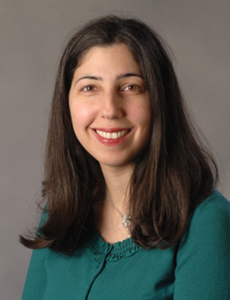Jan. 1, 2017:
Investigator Spotlight
Nasser Hanna, MD
Educational Background: BA in biology from St. Louis University; MD from University of Missouri-Columbia
Research Interests: My research interests are in the areas of lung cancer and testicular cancer. My lung cancer research has focused on the treatment of stage III and IV non-small cell lung cancer and extensive stage small cell lung cancer. I have led multiple phase II and III clinical trials in each of these disease states. I am also interested in studying novel therapies in the refractory setting of men with testicular cancer.
Fun Facts: I love watching open wheel racing.
I played competitive tennis in high school.
I have four children.
Thought Leader Perspectives: Esophageal Adenocarcinoma
Shadia Jalal, MD, assistant professor of medicine, Division of Hematology/Oncology at the Indiana University Melvin and Bren Simon Cancer Center.
 Esophageal adenocarcinoma is the fastest growing cancer in the United States and the western world. The majority of patients present with locally advanced disease. The standard of care currently is tri-modality therapy with chemotherapy and radiation followed by surgical resection. In spite of the multidisciplinary approach to the disease, only one third of patients are long-term survivors. Previous data show that patients with the highest chance of disease recurrence are those with residual disease after chemotherapy and radiation. Immunotherapy with programmed death pathway inhibitors is one of the major novel therapy options for various malignancies and growing evidence shows activity of these therapies in metastatic esophageal cancer. In our currently ongoing phase II study, BTCRC-ESO14-012, we evaluate the safety and efficacy of MEDI4736 (durvalumab) Following multi-modality therapy in esophageal cancer. Durvalumab is a promising programmed death-ligand 1 inhibitor.
Esophageal adenocarcinoma is the fastest growing cancer in the United States and the western world. The majority of patients present with locally advanced disease. The standard of care currently is tri-modality therapy with chemotherapy and radiation followed by surgical resection. In spite of the multidisciplinary approach to the disease, only one third of patients are long-term survivors. Previous data show that patients with the highest chance of disease recurrence are those with residual disease after chemotherapy and radiation. Immunotherapy with programmed death pathway inhibitors is one of the major novel therapy options for various malignancies and growing evidence shows activity of these therapies in metastatic esophageal cancer. In our currently ongoing phase II study, BTCRC-ESO14-012, we evaluate the safety and efficacy of MEDI4736 (durvalumab) Following multi-modality therapy in esophageal cancer. Durvalumab is a promising programmed death-ligand 1 inhibitor.
This trial is currently enrolling at University of Illinois Cancer Center, University of Michigan Health System, Michigan State University, University of Iowa Hospitals and Clinics (all Big Ten sites), in addition to Indiana University Melvin and Bren Simon Cancer Center. The primary goal is to assess whether immunotherapy in the adjuvant setting improves relapse free survival in this high risk group of esophageal cancer patients. This is the only study evaluating PD-L1 inhibition in this setting.
About the Big Ten Cancer Research Consortium: The Big Ten Cancer Research Consortium was created in 2013 to transform the conduct of cancer research through collaborative, hypothesis-driven, highly translational oncology trials that leverage the scientific and clinical expertise of Big Ten universities. The goal of the Big Ten Cancer Research Consortium is to create a unique team-research culture to drive science rapidly from ideas to new approaches to cancer treatment. Within this innovative environment, today’s research leaders collaborate with and mentor the research leaders of tomorrow with the unified goal of improving the lives of all patients with cancer.
About the Big Ten Conference: The Big Ten Conference is an association of world-class universities whose member institutions share a common mission of research, graduate, professional and undergraduate teaching and public service. Founded in 1896, the Big Ten has sustained a comprehensive set of shared practices and policies that enforce the priority of academics in the lives of students competing in intercollegiate athletics and emphasize the values of integrity, fairness and competitiveness. The broad-based programs of the 14 Big Ten institutions will provide over $200 million in direct financial support to almost 9,500 students for more than 11,000 participation opportunities on 350 teams in 42 different sports. The Big Ten sponsors 28 official conference sports, 14 for men and 14 for women, including the addition of men’s ice hockey and men’s and women’s lacrosse since 2013. For more information, visit www.bigten.org.
















Subscribe to the Big Ten CRC Newsletter X
X Facebook
Facebook YouTube
YouTube